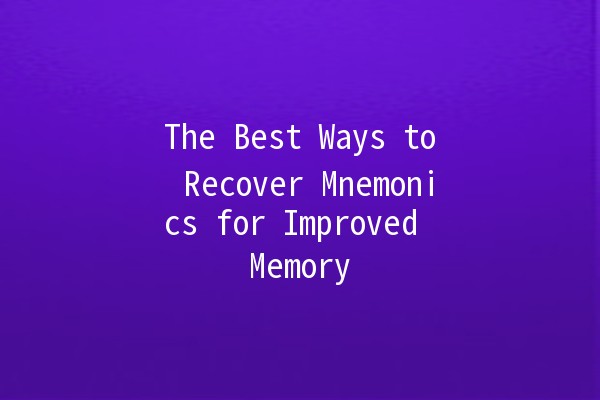
In our fastpaced world, the ability to retain information can be challenging. Whether you're a student trying to memorize important facts or a professional aiming to master new skills, mnemonic devices can serve as invaluable tools. This article delves into the best ways to recover and utilize mnemonics effectively, enhancing your memory and learning experiences.
Understanding Mnemonics: The Foundation of Memory
Mnemonics are strategies that aid in the recall of information by linking new data to familiar concepts. They can take various forms, including acronyms, rhymes, and visual imagery. By understanding how mnemonics work, you can leverage them for better retention of information in your daily life.

The Science Behind Mnemonics
Research shows that our brains are wired to remember images and stories more vividly than abstract information. This makes mnemonics particularly helpful. For instance, using visuals or stories can create strong mental connections that facilitate recall.
Different Types of Mnemonics
Tips to Enhance Your Mnemonic Recovery Process
Now that you understand the fundamentals of mnemonics, here are five practical techniques to enhance your memory retention through mnemonics.
Personalize your mnemonics. By linking what you want to remember to something meaningful in your life, you will have a stronger recall.
Example: If you're trying to remember the word "circuit," think of your favorite childhood toy that had a circuit board in it. This personal connection reinforces the memory.
Humans naturally respond well to stories. Build a narrative around the information you want to remember.
Example: If you're trying to memorize the process of photosynthesis (sunlight, water, carbon dioxide, glucose, oxygen), create a story where sunlight is a character soaking up water in a garden while breathing out oxygen like a friendly giant.
Transform abstract concepts into vivid images. The more bizarre and colorful, the better. This technique leverages our natural inclination to remember visuals.
Example: If you're studying the planets in our solar system, envision a giant blue whale swimming among the stars of outer space while each planet is represented by various fruits (e.g., Jupiter as a giant watermelon).
Instead of cramming, use spaced repetition to gradually revisit mnemonic devices over intervals. This strengthens memory consolidation.
Example: When learning a new language, utilize flashcards with mnemonics on one side and translations on the other. Review them at increasing intervals (1 hour, 1 day, 1 week) to cement your knowledge.
Involve multiple senses while memorizing. This could mean writing down your mnemonics, saying them aloud, and even acting them out.
Example: If you need to memorize a presentation, engage in roleplaying, using gestures to illustrate your points. This kinesthetic involvement promotes deeper learning.
Frequently Asked Questions About Mnemonic Recovery
Mnemonics are highly effective tools for memory retention as they utilize visual and auditory stimuli familiar to the user, making recall easier and faster. They help create mental shortcuts, which can drastically improve the speed at which information is retrievable.
Yes, mnemonics can be adapted to suit various types of information, including numbers, vocabulary, processes, and complex theories. The key is to tailor your mnemonic strategy to fit the kind of information you are trying to memorize.
There is no onesizefitsall mnemonic technique; the best method depends on individual preferences and the type of information being memorized. Experimenting with different techniques, such as acronyms or visualization, will help determine what works best for you.
To remember mnemonics, practice regularly using the spaced repetition method. Incorporate your mnemonics into everyday conversations or scenarios to reinforce learning and ensure they become second nature.
Yes, there are various apps available that can assist with creating and managing mnemonics, such as Quizlet or Anki. These tools allow users to incorporate images, sounds, and flexible flashcard systems to enhance memory recall.
To ensure that your mnemonics are effective, they should be personalized, memorable, and engaging. Incorporate humor, be creative, and connect the information to your interests. Test your mnemonics regularly to gauge their effectiveness.
By harnessing the power of mnemonics and integrating these strategies into your daily life, you can elevate your memory retention abilities significantly. Whether for academic studies, professional development, or personal growth, the best ways to recover and utilize mnemonics can lead to compelling learning experiences and lasting knowledge acquisition.

